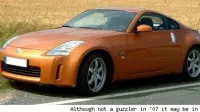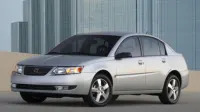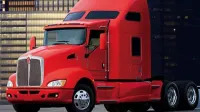Epa
Congress scrutinizes EPA decision to deny states' rights over regulating emissions
Any celebration over having passed a new national energy bill with requirements to raise Corporate Average Fuel Economy standards to 35 mpg by 2020 was instantly tempered when the EPA denied the right of California and 16 other states to set their own emissions standards. California governor Arnold Schwarzenegger immediately vowed to fight back and sue the EPA over its decision.
President Bush explains why EPA denied California's waiver to regulate tailpipe emissions
The EPA head denied California a waiver to regulate tailpipe emissions and used the recently passed CAFE standard as an excuse. President Bush took questions today at a press conference and it looks li
Sorry CARB: EPA says states can't regulate their own emissions
If you found it slightly strange that automakers went from being ardently opposed to any new EPA legislation to 100-percent behind the new proposal, you're not alone. Now the picture appears clearer, as the EPA has deemed any new California Air Resources Board (CARB) legislation an unnecessary evil. The significance of the new ruling is so far-reaching that the OEM savings can be hea
Correcting Toyota's mistake in correcting Boston Globe's mistake on Sequoia's MPG rating
We all make mistakes, but if I told you an article written by a Boston Globe editor (and then a correction by Toyota's Communications Vice President to that article) on something as simple as a car's MPG rating did not tell the whole truth, you might be surprised. That is the case and lets start with associate editor Derrick Jackson's article which says the the 2008 Toyota Sequoia "gets a reported 14 miles per gallon on streets and 14 mpg on highways." Communications VP Irv Miller writes on the
State of California sues EPA over tailpipe emissions
The State of California sued the EPA over failing to act on a tailpipe emissions waiver request. Fourteen other states will join California in the suit as interveners including Massachusetts, New York, Arizona, Connecticut, Illinois, Maine, Maryland, New Jersey, New Mexico, Oregon, Rhode Island, Vermont, Washington and Pennsylvania. California Air Resources Board filed the waiver on December 21, 2005 and six months ago they warned th
California set to sue EPA next week
EPA standards govern vehicle emissions such as NOx and hydrocarbons. They are byproducts of combustion that can be balanced with engine tuning, such as ignition timing and fuel delivery. They can also be reduced through devices such as catalytic converters. Catalytic converters cause a chemical reaction that converts carbon monoxide into carbon dioxide and hydrocarbons into carbon dioxide and water. However, earlier this year the EPA won a Merritt Johnson
EPA retrofits the Magic School Bus from the children book series with diesel particulate filter
This is the strangest and most wonderful thing I have read today. The EPA and Scholastic released a special edition of the popular children's book series the Magic School bus, called "The Magic School Bus Gets Cleaned Up." EPA Deputy Administrator Marcus Peacock recently read the book to school children in Cunningham Park Elementary School library in Vienna, Virginia. The students then went on Scholastic's traveling Magic School Bus, which includes interactive science experiments and a "new dies
EPA proposes its own oil regulations
The U.S. Congress isn't the only ruling body proposing new measures to curb the nation's reliance on foreign oil. The EPA is currently in the process of writing up new rules that it hopes will limit fuel consumption, and is currently gathering 75 regulators to help implement George Bush's '20-in-10' plan, which would see fuel consumption drop 20% in ten years.
Auto industry opinions on California CO2 rules not unanimous
Most executives in the auto industry speak with one voice when it comes to California's efforts to regulate greenhouse gas emissions from cars and trucks and it's not a positive tone. Carmakers don't like having a patchwork of regulations to meet because that can result in rules that are at cross purposes.
Revised 2008 EPA mileage numbers may cause more vehicles to qualify as "gas guzzlers"
You remember when we let you in on the news that for 2008 the EPA was revising their testing procedures to more accurately reflect the type of gas mileage that consumers are likely to get on their own, right? This change leads the numbers that a car is pegged with by the EPA to go down, which is probably a good thing, as the new numbers are most likely more accurate. And, now for
Gov't forgot to change Gas Guzzler tax
Back in December, we told you about the new method the government would be using to calculate fuel mileage. For the first time in twenty years, they decided to make changes to better reflect real-world driving conditions and driver behaviors. The changes went into effect starting with 2008 model year cars, and are evident in the newly styled window stickers on those vehicles (shown above). We correctly surmised that most estimates would go down by some degree using this new formula. In our comme
ForbesAutos picks the 12 greenest cars
In selecting the 12 greenest vehicles, ForbesAutos editors split the roster between hybrids and traditional gas engines that are small and well-tuned. The editors also used EPA data to factor in air pollution and greenhouse gas emissions. The Prius and Civic Hybrid are the only two vehicles to score the highest rating of 10 in greenhouse gases. Who's on the list? You can check out the Mike Magda
GM plans to cut manufacturing CO2 emissions by 40% by 2010
General Motors yesterday pledged to cut the carbon dioxide emissions from its manufacturing plants in North America by forty percent over the next three years. The reduction amounts to 4.5 million metric tonnes of CO2. This is part of GM's participation in the EPA Climate Leaders program which brings together business and government to find ways to reduce greenhouse gas emissions.
South Dakota Senator wants to scale the ethanol 'fuel wall' from E10 to E20
Sen. John Thune, the Republican who ousted Senate Minority Leader Tom Daschle in 2004, says it's time for all gas pumps to offer E20 blends.
Trucks ready to roll on EPA's 2007 clean diesel spec
Industry organisation, Diesel Technology Forum, has announced that all major heavy-duty truck and engine manufacturers have met new Environmental Protection Agency standards for emissions cuts and have been certified by EPA for full production. To meet the new emissions requirements, new long-haul trucks are equipped with particulate matter filters which result in 2007 models
Detroit Auto Show: Will the Volt generate new EPA regulations and ratings?
While the Chevy Volt continues to reap industry praise, some insiders at GM are contemplating the "ifs" should this vehicle come to market. While at the Detroit Auto Show, I was talking to three key GM product planners and asked about potential emissions regulations for the Volt.
Fuel cells added to California zero emission vehicle program
"Battery technology has been moving forward and batteries are still zero-emission technology, but the car companies have made it very clear that fuel cells are the technology of the future," said Jerry Martin, an Air Resource Board spokesman. This statement comes after the EPA approved regulation amendments to the California Zero Emissions Vehicle program. "This waiver simply reflects the prominence of fuel cells, fuel cells have really taken off," added John Millet, a spokesman for the EPA.

















